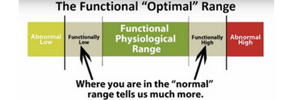“Your blood test results came back and everything looks normal.” How often have you heard this? Being told things are “normal” may provide a sense of relief, but if you are experiencing symptoms and feeling unwell it can leave you frustrated and concerned. It may also leave you wondering if something was missed.
When an MD looks at blood test results their primary concern is if a result is outside the normal range. This represents a pathology, or disease state. If a pathology is not present you are considered healthy. If your numbers are within the normal range then everything is considered normal. The issue with this approach is that by the time you are outside of that “normal” range, you are likely in real trouble.
95% of patients tested will fall within the “normal” range. That does not mean your body is functioning optimally. It just means that you have not yet progressed to a known disease state that the medical community recognizes.
Most “normal” reference ranges are too broad to adequately detect health problems before they become a disease, and are not useful for detecting dysfunction.
“Normal” is far from optimal when it comes to your health. Here’s why:
-
Normal reference ranges are based on statistics.
-
They are generated on a bell curve and only represent average populations, not healthy populations.
-
The normal reference ranges tend to change from year to year depending on the prevalence of disease in the general population
-
The ranges are vast: as our population suffers from more heart disease, obesity, diabetes etc, the normal reference ranges get wider and wider. This leaves a larger number of the population testing in a range considered normal
-
They do not represent the optimal level required to maintain good health and function
-
A high normal or low normal is not ideal. Once you are in these ranges your body is already in a disease state and/or experiencing tissue change and pathology
What you want is “optimal” health as opposed to “normal” health.
When was the last time your doctor sat down and went through your actual results with you? Did you have a discussion about your results? Do you have a clear understanding of what was being tested and the significance of the result?
Any doctor can order a blood test. The value is in the interpretation.
When I analyze blood work I am looking to see if your result falls within the functional optimal range. This range tells me if your body is functioning in an optimal state. I’m also looking for patterns and changes in the way your body is working, so we can prevent the onset of illness and disease.





Leave a Comment